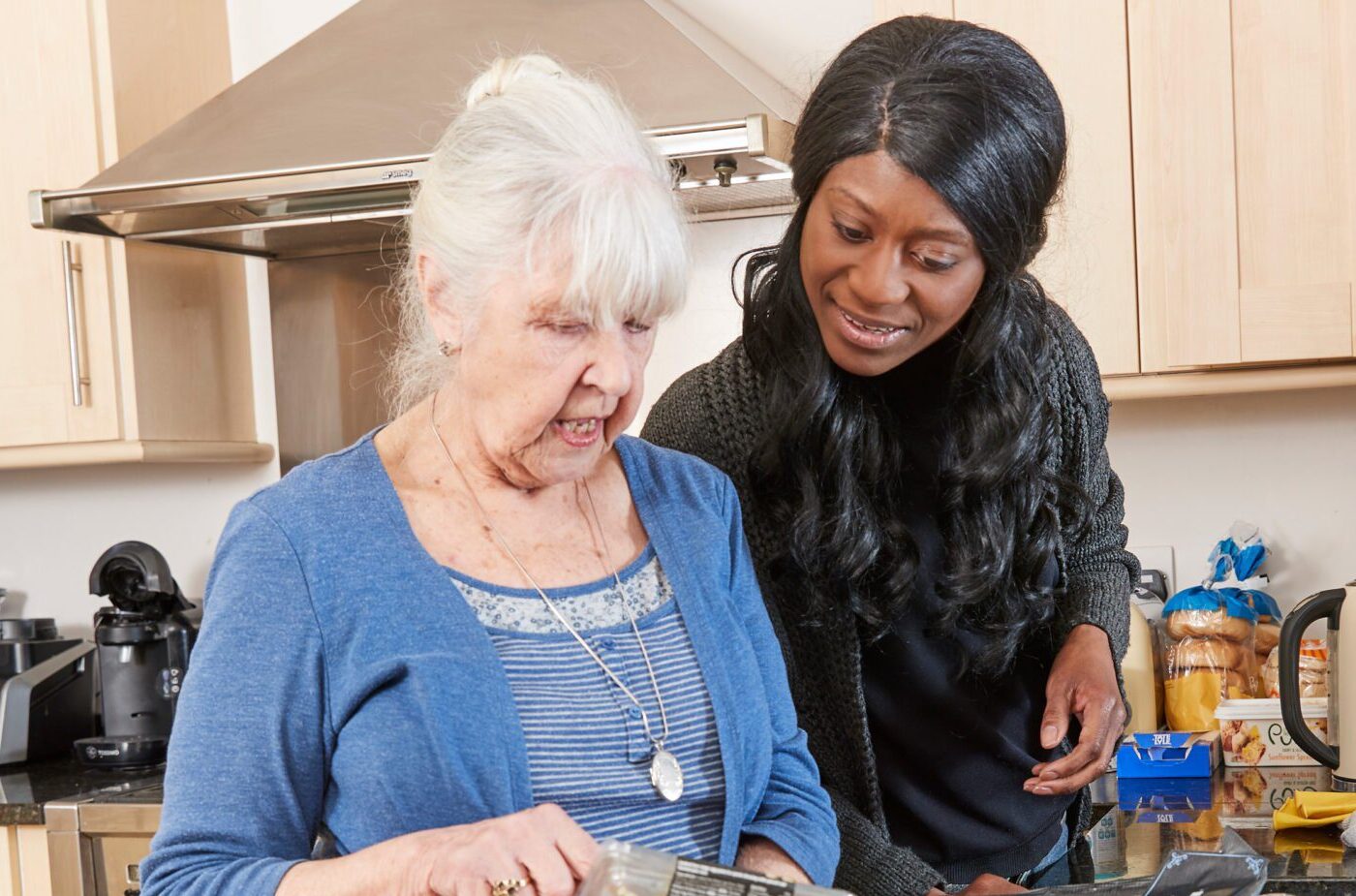Live-in care vs other types of care
Tags
Live-in care
Navigating elderly care options for a loved one is a significant decision. While care homes are a common consideration, live-in care offers a compelling alternative, providing dedicated, personalised support in the comfort and familiarity of your loved one’s home. This guide will help you quickly compare various care types to find the best fit for them.
How does live-in care compare with the other types of care?
To help you quickly compare the key features of each care type, we’ve put together this comparison table that highlights essential differences in setting, support, independence, and cost.
| Live-in care | Care home | Nursing home | Assisted living | Visiting care | |
|---|---|---|---|---|---|
| Setting | Home | Residential facility | Residential facility | Private flat | Home |
| Medical Support | Basic | Basic | High | Basic | Basic |
| Independence | High (Maintain routine) | Low (Communal living) | Low (Regimented routine) | Medium (Own flat) | High (Maintain routine) |
| Companionship | Constant 1:1 | Community (Group activities) | Community (Group activities) | Community (Optional) | None (scheduled visits) |
| Cost | Elder live-in care from £1,150/wk* | £1,300 to £2,500/wk* | £1,500+/wk* | £1,500/wk + fees* | Elder visiting care from £30 p/h* |
| Personalisation | Extensive | Limited | Limited | Medium | Limited (time-bound) |
| Pet-friendly | Yes | No | No | Varies | Yes |
| Familiarity | High (Stay at home) | Low | Low | Medium | High (Stay at home) |
| Care for couples | Excellent (Stay together at home) | Varies (Double rooms limited) | Less common (Single rooms) | Often available (Couple's flats) | Possible (Scheduled for both) |
*Prices are indicative and may vary based on individual needs, location, and provider. We recommend doing your own research and contacting providers for personalised quotes.
Understanding the different types of elderly care available
To help you make the best choice, here are the main care options to consider:
- Live-in care: For continuous, personalised support in one’s own home.
- Care homes: For personal care and accommodation.
- Nursing homes: For advanced medical needs.
- Assisted living: For independent living with support.
- Visiting care: For scheduled support at home.
- 24-hour care: Intensive, round-the-clock support.
- Dementia care: Specialist support for people with dementia.
Remember: it’s a personal family decision
The ultimate choice of care for your loved one is deeply personal. Focus on their individual needs, preferences, and comfort, ensuring you are not pressured into any single option.
Live-in care
Live-in care involves a professional carer moving into your loved one’s home to provide continuous, round-the-clock support, companionship, and assistance with all daily needs.
Advantages
- Dedicated, round-the-clock care tailored to your loved one's needs.
- Your loved one stays in their familiar surroundings.
- Reassurance of safety and well-being, while maintaining your loved one's independence.
- Often more affordable than a care home, with potential funding.
- Easier to remain socially engaged, with carer’s support for outings and activities.
- Fewer falls/hospital admissions, continuous GP access, and quicker hospital discharge.
Disadvantages
- Requires adjusting to a carer living in the home.
- Home adaptations may be needed.
- Complex medical procedures generally require a registered nurse.
Learn more about live-in care.
Elder’s Love-Your-Carer Guarantee
Is your loved one worried about a new person in the home? Elder prioritises compatibility. We shortlist carers based on your loved one’s needs and preferences, allowing you to choose the best fit. In fact, 9 out of 10 Elder customers find their ideal carer the very first time!
Care homes
Care homes provide accommodation and personal care support for elderly individuals who struggle to live independently, without on-site registered nursing care.
Advantages
- Staff available day and night for emergencies and support.
- Group activities and communal areas combat loneliness.
- All daily needs are managed.
- Help with administering non-complex medication.
Disadvantages
- Requires significant adjustment to a new environment.
- Limits personal freedom and established routines.
- Restrictions on personal belongings and pets.
- One-on-one care may be limited compared to home-based options.
Nursing homes
Nursing homes, or ‘care homes with nursing’, provide accommodation and continuous medical care from registered nurses for individuals with complex, intense, or unpredictable health needs.
Advantages
- Registered nurses are always on-site for acute care.
- Meals, activities, and routines are organised.
- Can foster a sense of community among residents.
- Often eligible for NHS-Funded Nursing Care or NHS Continuing Healthcare.
Disadvantages
- Can limit personal control and impact mental well-being.
- Requires moving away from home, family, and personal possessions.
- Can be very expensive if not fully funded.
- Reduced autonomy compared to home-based options.
Assisted living
Assisted living offers a blend of independent living within self-contained flats and on-call personal care support, aiming to maintain autonomy within a community setting.
Advantages
- Residents have their own private living space.
- Organised activities and communal areas foster social interaction.
- Staff available for assistance when needed.
- Adaptations and support help ensure a secure environment.
Disadvantages
- Often expensive, with limited council funding availability.
- Still involves moving from one's existing home.
- May not be appropriate for complex or high-level medical needs.
- Can be harder to find spaces in all areas.
Learn more about assisted living.
Considering alternatives to assisted living?
Given the high costs of assisted living, it’s worth exploring alternatives. Your local authority might offer financial support to adapt your loved one’s home, allowing them to stay in familiar surroundings. Depending on their location, up to £36,000 could be available through the Disabled Facilities Grant for major adaptations, or up to £1,000 for minor adjustments.
Visiting care
Visiting care (or domiciliary care) involves a caregiver visiting an individual’s home at set, scheduled times to provide personal care and practical support, allowing them to remain in their own home.
Advantages
- Your loved one remains in their familiar environment.
- Care is tailored to specific, time-bound needs.
- Minimises disruption to existing daily life.
- Alleviates some caregiving burden from family members.
Disadvantages
- Help is only available during scheduled visits.
- May involve multiple different carers.
- Carers have tight schedules, limiting flexibility during visits.
- No immediate assistance outside of scheduled times.
Learn more about visiting care.
Specialised care considerations
Some care needs require specific expertise. Here’s how common specialised care types fit into the broader comparison:
24-hour care
24-hour care means a care professional is actively present and awake to provide support at all times, suitable for very intensive, unpredictable, or end-of-life care needs.
How it compares to other care types: While both care homes and nursing homes can offer 24-hour supervision, 24-hour live-in care provides continuous, one-to-one support in the comfort of your loved one’s home, often involving a rotation of two or more carers. This offers unparalleled consistency and personalised attention, particularly crucial for palliative or complex needs.
Learn more about 24-hour live-in care.

Dementia care
Dementia care is specialist support tailored for individuals living with cognitive conditions like Alzheimer’s or vascular dementia, focusing on maintaining independence, safety, and well-being.
How it compares to other care types: While specialist dementia care homes exist, live-in dementia care offers the benefit of staying in a familiar environment, which is highly beneficial for those with memory conditions. A consistent live-in carer provides the continuity and familiarity crucial for reducing anxiety and enhancing quality of life, unlike the potentially rotating staff found in some residential settings.
Learn more about dementia care.
Deciding on the best care option
Choosing the ideal care for your loved one requires careful consideration. Use the following factors to guide your decision:
Assess individual needs
Start by evaluating your loved one’s specific care requirements, including mobility, medical conditions, cognitive abilities, and personal preferences. Consider how each care type aligns with their unique needs.
Consider quality of life
Think about the living environment your loved one would thrive in. Options range from the familiarity and independence of their own home with live-in care or visiting care, to the community settings of assisted living facilities, care homes, or nursing homes.
Evaluate cost and budget
Care costs vary significantly across all types. Consider your financial situation and budget constraints when weighing the options. The table above provides an indicative overview, but deeper research into funding for each option is vital.
Review family dynamics
Take into account the preferences and involvement of family members in the decision-making process. Discuss what level of oversight and involvement feels right for your family with each potential care solution.
Seek professional advice
Consult with healthcare professionals and care providers to gain insight and guidance on the most suitable option based on your loved one’s individual circumstances. They can offer valuable expertise and recommendations tailored to specific care needs and preferences. Contact our Elder care advisors for impartial support and guidance tailored to your needs.
Ultimately, the decision should prioritise the well-being, comfort, and preferences of your loved one. By carefully considering these factors and seeking informed advice, you can make a choice that ensures the highest quality of care and enhances your loved one’s overall quality of life.
FAQs about live-in care vs other care types
-
What’s the difference between a care home and a nursing home?
The main difference between a care home and a nursing home lies in the level of medical care provided. Care homes offer support with daily living activities and personal care, while nursing homes provide 24/7 trained nurses.
-
What’s the difference between a care home and home care?
The main difference between a care home and home care lies in the setting where care is provided. Care homes are residential facilities where individuals live and receive 24-hour care. Home care, on the other hand, involves receiving care in the individual's own home.
-
What’s the difference between live-in care and a care home?
The key difference between live-in care and a care home is the environment and type of support.
Live-in care provides one-on-one, personalised support where a carer lives with your loved one in their own home, allowing them to maintain independence and familiar surroundings.
Care homes offer round-the-clock care in a communal, residential facility, where individuals live alongside others and share facilities.
-
What’s the difference between live-in care and 24-hour care?
The main difference between live-in care and 24-hour care is the continuity of active support.
With live-in care, a single caregiver lives in your loved one's home, offering support and companionship but typically having scheduled rest periods.
24-hour care, conversely, involves multiple caregivers working in shifts to ensure constant, awake, and active support throughout the entire day and night.


